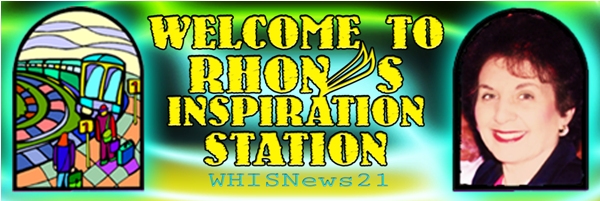Rhon's Inspiration Station: Walk With God

– Rhon
+++++++++++++++++++++++++++++++++++++++++++
“WHEN YOU SAY I AM BLESSED”
PASTOR JOEL OSTEEN
When you say I am blessed declare it from your mouth ! Nothing happens till you speak, then God’s favor surrounds you! One more step declares what you believe ! Say 2013 is my year- and for the Angels to go to work! SAY…God you are bigger than any obstacles I encounter. Are you declaring victory over your life???? Important to declare what you believe !
Example :
Go in front of a mirror- get comfortable ,think positive or negative !
YES if you speak this out loud you are bold enough to SAY IT AND BELIEVE IT
YOU need to speak positive, in spite of what you feel. Don’t use negatives, instead believe you can change situations.
If you use positive statements like everything is getting better, you will be moving closer to what you want ! Yes, you will be moving in the right direction, and have GRACE from God . You will gain courage and confidence. Make a list of what you want changed. DO NOT focus on past mistakes. Speak the words in the direction you want to go. Turn your direction around to POSITIVE.
TALK ABOUT WHAT YOU WANT TO BE !
Break any bad addictions you may have ! Send your words in a new direction.
EVERY day declare dreams you have will happen.
PRACTICE TILL IT BECOMES PART OF YOUR EVERY DAY THINKING
I AM STRONG, I AM BLESSED, I AM CONFIDENT, I AM SECURE, I AM FOCUSED I AM WELL, I LIKE MY LOOKS, I HAVE A GOOD PERSONALITY
THERE ARE OPPORTUNITIES COMING MY WAY
2013 IS MY YEAR
GOD IS ON HIS THRONE & WILL TELL ME & GUIDE ME WHAT I WILL BE !
…..WHEN YOU SAY I AM BLESSED, YOU ARE DECLARING JESUS IS WITH ME….. I AM NEVER ALONE !
=============================================================================
DR CHARLES STANLEY “In Touch Ministries” “GOD WANTS THE BEST IN YOUR LIFE” ( The Fulfillment Of A Promise) God keeps every promise he’s made and never breaks a promise ! Ever wonder does God answer prayers ??? Read Genesis 12:1-3 God has a purpose for your life. God makes his promises clear ! God wants the BEST for your life! He will provide a way for YOU ! God makes his promises clear ! TO UNDERSTAND MORE
The Book of Genesis
The basic narrative expresses the central theme: God creates the world and appoints man as his regent, but man proves disobedient and God destroys his world through the Flood. The new post-Flood world is equally corrupt, but God does not destroy it, instead calling one man, Abraham, to be the seed of its salvation. At God’s command Abraham descends from his home into the land of Canaan, given to him by God, where he dwells as a sojourner, as does his son Isaac and his grandson Jacob. Jacob’s name is changed to Israel, and through the agency of his son Joseph, the children of Israel descend into Egypt, 70 people in all with their households, and God promises them a future of greatness. Genesis ends with Israel in Egypt, ready for the coming of Moses and the Exodus. The narrative is punctuated by a series of covenants with God, successively narrowing in scope from all mankind (the covenant with Noah) to a special relationship with one people alone (Abraham and his descendants through Isaac and Jacob).[2]
The book’s author or authors appear to have structured it around ten “toledot” sections (the “these are the generations of…” phrases), but modern commentators see it in terms of a “primeval history” (chapters 1–11) followed by the cycle of Patriarchal stories (chapters 12–50).[3] For Jews and Christians alike, the theological importance of Genesis centers on the covenants linking God to his Chosen People and the people to the Promised Land. Christianity has interpreted Genesis as the prefiguration of certain cardinal Christian beliefs, primarily the need for salvation (the hope or assurance of all Christians) and the redemptive act of Christ on the Cross as the fulfillment of covenant promises as the Son of God. Tradition credits Moses as the author of Genesis, Exodus, Leviticus, Numbers and most of Deuteronomy, but modern scholars increasingly see it as a product of the 6th and 5th centuries BC.[4][5]
Genesis appears to be structured around the recurring phrase elleh toledot, meaning “these are the generations,” with the first use of the phrase referring to the “generations of heaven and earth” and the remainder marking individuals—Noah, the “sons of Noah”, Shem, etc., down to Jacob.[6] It is not clear, however, what this meant to the original authors, and most modern commentators divide it into two parts based on subject matter, a “primeval history” (chapters 1–11) and a “patriarchal history” (chapters 12–50).[7] While the first is far shorter than the second, it sets out the basic themes and provides an interpretive key for understanding the entire book.[8] The “primeval history” has a symmetrical structure hinged around chapter 6–9, the flood story, with the events before the flood mirrored by the events after.[9] The “patriarchal history” recounts the events of the major patriarchs Abraham, Isaac and Jacob, to whom God reveals himself and to whom the promise of descendants and land is made, while the story of Joseph serves to take the Israelites into Egypt in preparation for the next book, Exodus.
Summary
God creates the world in six days and consecrates the seventh after giving mankind his first commandment: “be fruitful and multiply”. God pronounces the world “very good”, but it becomes corrupted by the sin of man and God sends a deluge (a great flood) to destroy it, saving only the righteous (Noah) and his family, from whose seed the world is repopulated. Man sins again, but God has promised that he will not destroy the world a second time with water.
God instructs Abram (the future Abraham) to travel from his home in Mesopotamia (modern Iraq) to the land of Canaan. There God makes a covenant with Abram promising that his descendants shall be as numerous as the stars in the heavens, but that they shall suffer oppression in a foreign land for four hundred years, after which they shall inherit the land “from the river of Egypt to the great river, the river Euphrates.” Abram’s name is changed to Abraham and that of his wife Sarai to Sarah, and circumcision of all males is instituted as the sign of the covenant.
Sarah is barren, and tells Abraham to take her Egyptian handmaiden, Hagar, as a concubine. Through Hagar, Abraham becomes the father of Ishmael. Abraham asks God that Ishmael “might live in Thy sight,” (that is, be favored), but God replies that Sarah will bear a son, who will be named Isaac, through whom the covenant will be established. At Sarah’s insistence Ishmael and his mother Hagar are driven out into the wilderness, but God saves them and promises to make Ishmael a great nation.
God resolves to destroy the city of Sodom for the sins of its people. Abraham protests that it is not just “to slay the righteous with the wicked,” and asks if the whole city can be spared if even ten righteous men are found there. God replies: “For the sake of ten I will not destroy it.” Abraham’s nephew Lot is saved from the destruction of Sodom, and through incest with his daughters becomes the ancestor of the Moabites and Ammonites.
God tests Abraham by demanding that he sacrifice Isaac. As Abraham is about to lay the knife upon his son, God restrains him, promising him numberless descendants. On the death of Sarah, Abraham purchases Machpelah (modern Hebron) for a family tomb and sends his servant to Mesopotamia to find among his relations a wife for Isaac, and Rebekah is chosen. Other children are born to Abraham by another wife, Keturah, among whose descendants are the Midianites, and he dies in a prosperous old age and is buried in his tomb at Hebron.
Isaac’s wife Rebekah is barren, but Isaac prays to God and she gives birth to the twins Esau, father of the Edomites, and Jacob. Through deception, Jacob becomes the heir instead of Esau and gains his father’s blessing. He flees to his uncle where he prospers and earns his two wives. Jacob’s name is changed to Israel, and by his wives Rachel and Leah and their handmaidens he has twelve sons, the ancestors of the twelve tribes of the Children of Israel, and a daughter, Dinah.
Joseph, Jacob’s favourite son, is sold into slavery in Egypt by his jealous brothers. But Joseph prospers, and when famine comes he brings his father and his brothers and their households, seventy persons in all, to Egypt, where Pharaoh assigns to them the land of Goshen. Jacob calls his sons to his bedside and reveals their future to them before he dies and is interred in the family tomb at Machpelah. Joseph lives to see his great-grandchildren, and on his death-bed he exhorts his brethren, if God should remember them and lead them out of the country, to take his bones with them. The book ends with Joseph’s remains being “put in a coffin in Egypt.”
*******




Comments are Closed